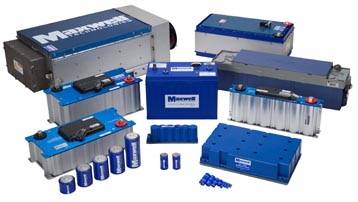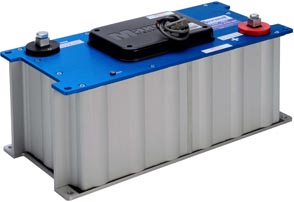BY BRIAN EICHLER
Director of Sales, Americas and Asia Pacific
Maxwell Technologies
www.maxwell.com
As the use of renewables increases globally, stricter energy standards call for efficient, cost-effective technologies. A big market area for these technologies is in transportation, especially as cities pursue green initiatives. No country understands this more than China, where pollution has become such a problem that the nation has imposed driving restrictions and factory shutdowns when the air quality reaches dangerous levels. Ultracapacitors are energy storage and power delivery devices that are in use throughout China and the rest of the world to save energy and improve efficiency in a variety of applications from construction equipment to consumer electronics. Ultracapacitors, also called supercapacitors, play an important role in China's transition to a cleaner future by powering public buses to save energy and reduce carbon emissions.

Fig. 1: Many sizes and configurations of ultracapacitors are available.
In heavy transportation vehicles, such as buses, energy storage devices must be reliable to ensure that the source of transit is both dependable and energy-efficient. With their long operational life and low maintenance requirements, ultracapacitors are used in nearly 15,000 buses all over the world. Ultracapacitors work by storing energy in an electric field — putting an electric charge on plates that are separated by an insulator. Though ultracapacitors cannot store as much energy as batteries, they can charge and discharge energy very quickly. Unlike batteries, ultracapacitors can operate reliably in extreme temperatures from –40° to 65°C and handle disturbances such as shock and vibration. Ultracapacitors can operate for 1 million or more charge-discharge cycles in most cycling applications or last 10 years or longer in standby power applications.
Buses that incorporate ultracapacitors see energy savings from the process of regenerative braking, by capturing energy when the bus brakes, and then using that energy to provide a short burst of power during acceleration. Diesel hybrid electric buses using ultracapacitors see a 20% to 30% reduction in fuel consumption. Ultracapacitors can also be used to complement or replace batteries altogether, making them a flexible energy-saving technology. Because ultracapacitors have high-power capability while batteries have high-energy capability, the combination of the two technologies works very well in vehicle applications.

Fig 2: The 48-V 165F ultracapacitor module.
One application example is in hybrid buses in China. Using Maxwell Technologies' 48-V ultracapacitor modules, they see a fuel economy improvement of approximately 30%. This coming year, China plans to deploy more plug-in hybrid buses, a move that is expected to raise fuel economy improvement to 50%. As China explores ways to reduce its carbon footprint and address pollution in its energy policies, urban transportation is an important area where the country can benefit from energy-saving technology. Because they are cost efficient and reliable, ultracapacitors will continue to play an important role as the nation's main energy storage solution, while also expanding as a global energy-saving technology in a wide range of industries.
Advertisement
Learn more about Maxwell Technologies





